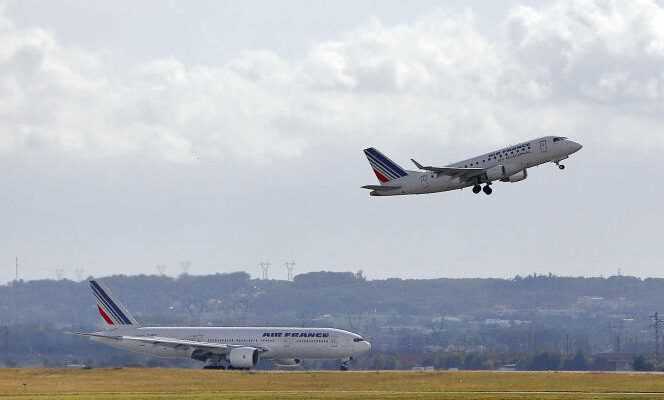Transport companies, whether air or sea, will continue to pay heavy fines if they refuse to take illegal aliens on board with a view to their deportation. But they are no longer required to use force, confirmed Friday, October 15, the Constitutional Council.
The members of the court were seized of a priority question of constitutionality (QPC) introduced by Air France in the summer. After being imposed two fines, of 15,000 and 20,000 euros, in 2017 “For having failed in his obligation to redirect” foreign nationals, the French airline had turned to justice to challenge the basis of two articles of the code of entry and stay of foreigners and the right of asylum (Ceseda).
The latter provides that this type of company is liable to a maximum fine of 30,000 euros if it refuses such an eviction: under the terms of the law, it is, in effect, “Bound to bring back without delay”, at the request of the authorities, the foreigner to whom the stay is refused “At the point where he started to use the means of transport”.
To Air France, which considered in substance that such an obligation forced it, in fact, to set up private escort companies to ensure safety on board, the Constitutional Council replied on Friday that “The contested provisions have neither the object nor the effect of imposing on these companies an obligation to supervise the person to be redirected or to exert a constraint on him, such measures falling solely within the competence of the police authorities “.
“They do not deprive the captain of his ability to disembark a person presenting a danger to the safety, health, cleanliness or good order of the aircraft”, underlined the college, declaring the disputed texts “In accordance with the Constitution”.
” A victory “
More than on that of fines, it is around this question of the use of force that the basis of the dispute has been. In this regard, by specifying that the law does not oblige companies to take the place of law enforcement powers and by guaranteeing freedom to the captain, the Constitutional Council ruled in favor of Air France.
“It’s a victory! “, moreover reacted to Agence France-Presse (AFP), Mr.e Cédric Uzan-Sarano, who represented the French company in this case. “With the framework set by the Constitutional Council, the ministry will no longer be able to impose fines when the captain has decided that the behavior of an individual does not allow him to be kept on board, and he will no longer be able to reproach the companies not to have mobilized a private escort “, he said, recalling that Air France is contributing to the expulsion of “Thousands” of people ” no problem “, for “Considerable costs”.
“I am extremely satisfied with the decision, which proves us completely right”, abounded Me Isabelle Zribi, who notably represented Anafé (National Association of Border Assistance for Foreigners) in this procedure.
The constitutionnal Council “Clearly states that transport companies cannot and must not exercise powers of constraint or surveillance over people not admitted to French territory to force them to board. The decision therefore provides important guarantees for people who are not admitted ”, she stressed. “This puts a brake on the privatization of migration policies and reduces the risk of violence by private persons”, also greets Charlène Cuartero Saez, an official of Anafé.
At the end of 2019, the Constitutional Council had already declared compliant another part of the Ceseda, which made it possible to impose fines on these same carriers if they boarded on board, bound for France, foreign nationals whose documents travel documents were not in order or fraudulent. In short, if the company had not properly checked these documents (for example a visa) at the departure airport.
